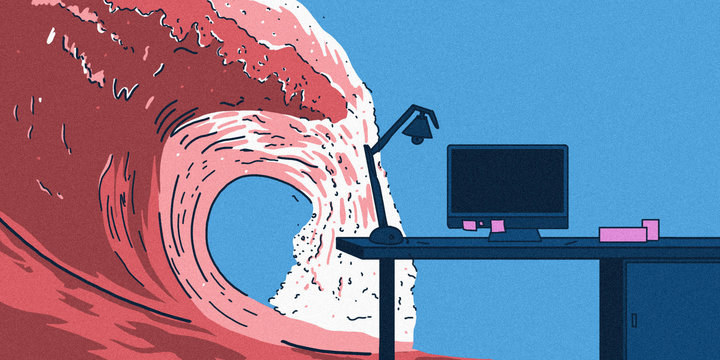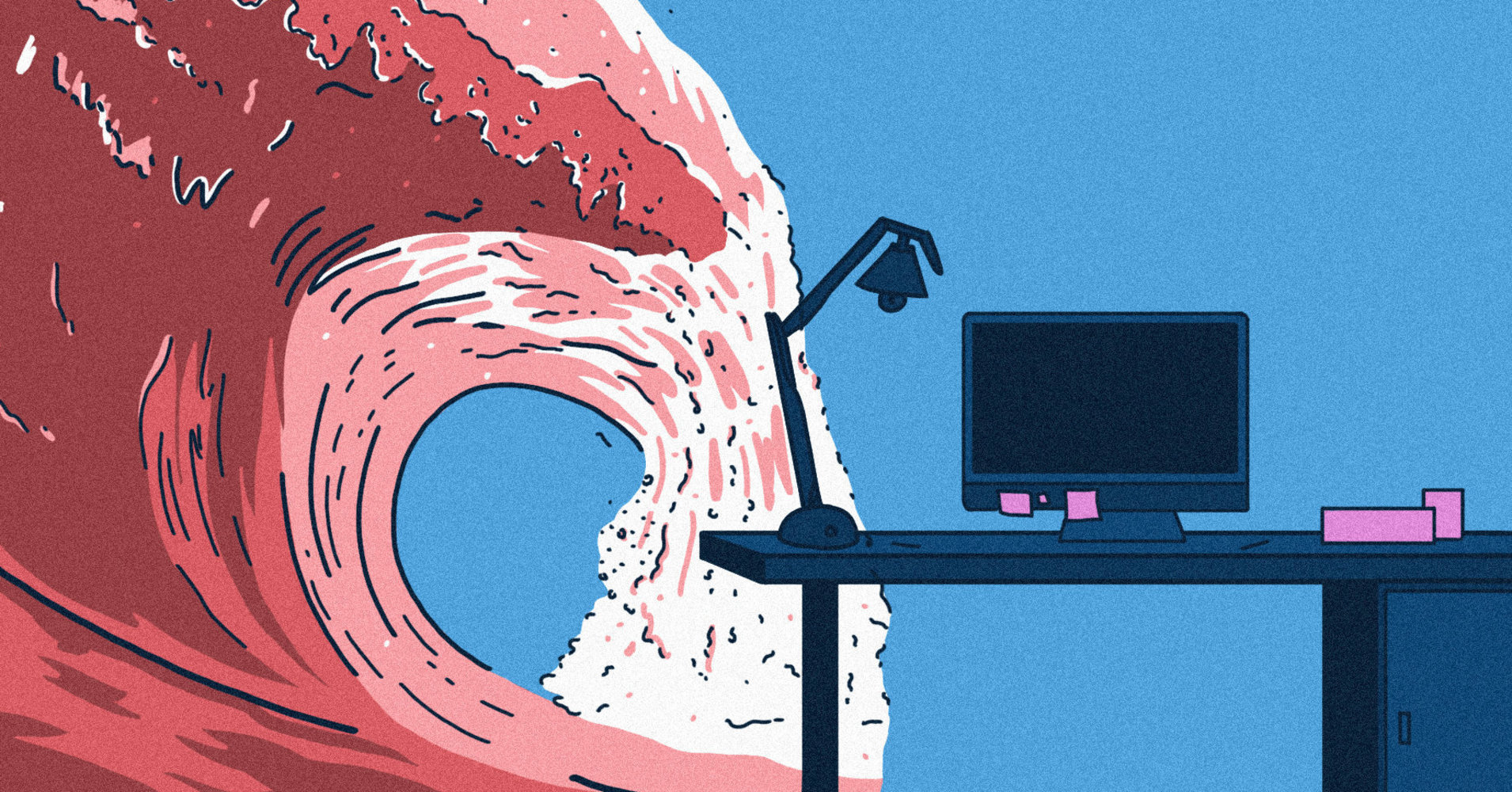[ad_1]
What Women Want Now is a program by HuffPost and her sister sites dedicated to creating content about the issues and stories that matter most to women. Read more here. Join the conversation with #WhatWomenWantNow.
The road to the period revolution is lined with pads. And tampons. When they’re available, that is.
Having a job and having a period are two realities for many people, and the experiences come with trials and tribulations ― especially when they happen at the same time.
There’s the feeling of walking to a bathroom with a tampon hidden in your sleeve, the nightmarish process of crumpling up a wad of toilet paper to use as makeshift protection in a pinch and the agony of dealing with cramps in a workplace that lacks empathy.
In an effort to facilitate an open and honest conversation about the state of having a period at work looks like today, HuffPost heard dozens of stories from women ― some heartbreaking, some hilarious ― that make it apparent that, despite some instances of accessibility and openness about menstruation, there is still a long way to go.

Dealing With Mental (And Physical) Period Pain At The Office
Jenn, 42, works for a bank in an environment she described as “your typical old-fashioned banking experience.”
“Imagine a lot of men, many of them older, wearing suits,” said Jenn, who asked to be identified by only her first name so she wouldn’t be identified by co-workers.
“I have to sit in meetings surrounded by men and deal with cramps, headaches, backaches and sudden rushes of blood coming out of me,” she said. “Dealing with your period isn’t fun even when you’re home on your couch. Sitting in a conference room in a dress with stocking and four-inch heels on? Well, it’s just like hell on earth.”
Jenn said her company “does nothing” to make the experience any easier.
“We don’t even have machines in the ladies room to buy pads or tampons if we’re unprepared,” she said. “I understand speaking openly about my cycle is not something men want to hear. But I can dream of a world where I can comfortably excuse myself from a meeting because I feel I just went through a pad and blood is going to go through my dress. I can dream that I won’t be seen as weak because my cramps hurt so much that I want to take a day off.”
“The amount of side-eye, eye-rolling, disbelief and outright shaming I’ve received throughout my career and academic years is ridiculous.”
– D., 38
Monica, who also asked that her last name not be published, said she had a particularly unfortunate experience while visiting her company’s corporate headquarters for a big interview.
“I look like a crime scene happened,” said Monica, 48, recalling what had happened. “I’m trying to clean it up as best I can and to keep blood off the floor. I finish inserting a tampon and it’s covered in blood ― and slippery. I drop it, it rolls out of my stall and onto the woman in the next stall’s shoe. I tried to grab it as fast as I could, but was mortified. All I could do was apologize profusely.”
D., a 38-year-old in New York City who did not want her name to be published for privacy reasons, said her struggle with endometriosis, a disorder in which the tissue that is supposed to line the inside of the uterus grows instead outside of it, has made getting her period at work even worse. Pain ― one of the disease’s many symptoms ― is especially prevalent during menstruation.
“The amount of side-eye, eye-rolling, disbelief and outright shaming I’ve received throughout my career and academic years is ridiculous,” said D., who works in media. “Everything from ‘it’s just cramps, get over it’ to ‘ugh, you have your period again?’ would be laughable if it wasn’t so painful and traumatizing.”
She said she also worries that taking off days as a result of endometriosis could impact her job status, and she’s concerned people think she is faking the pain.
“It’s emotionally, physically and mentally exhausting to have to explain that it’s a disease, it’s real and it’s every month,” she said.
Embarrassment and discomfort are just two of the potential downsides of getting your period at work.
In 2016, Alisha Coleman was working as a 911 call taker in Fort Benning, Georgia, when she unexpectedly got a heavy period. She leaked onto her chair twice and alleged she was fired as a result. The American Civil Liberties Union stepped in when Coleman’s case was dismissed by a district court, and it was eventually settled.
The ACLU told HuffPost it couldn’t comment on the particulars of the case, but its website says Coleman experienced “unlawful workplace discrimination.”
Destigmatizing Bleeding On The Job
Unsurprisingly, it seems like one of the best places to work if you have a period is at a company that sells period products.
Natalie Lam, a social media manager for U.K.-based brand Natracare said her office supplies menstrual products, hot water bottles and fruit that combats cramps ― and that there’s no stigma or embarrassment when it comes to talking about it.
At Knix, an intimates brand that sells leakproof underwear, there is a desire to have a similarly open culture.
“It’s a topic that comes up almost daily and we look to everyone to contribute,” founder and CEO Joanna Griffiths told HuffPost.
She said she got plenty of confused looks when she launched the brand in 2013.
“There is still a large set of people who are very uncomfortable with the concept of underwear that blocks leaks,” she said. “When I was trying to find capital for the company, I often heard that it was a ‘niche’ category, as if to say that periods and stress incontinence, which affects 1 in 3 women, was niche?!”
“A lot of people say, ‘Do we need to offer condoms if we offer pads and tampons?’ and I’m like, ‘No!’ Sexual intercourse is a choice. Getting your period is not.”
– Nancy Kramer, founder of Free The Tampons
Griffiths said openly talking about periods is a great step toward destigmatizing the issue.
“Acknowledging that periods are different for everyone, and for some they can be painful to a debilitating degree is important, especially for people with [polycystic ovary syndrome] or another medical syndrome,” she said, adding that support at work ― potentially including the ability to take time off ― is crucial.
But the idea of menstrual leave, which would enable people with periods to take time off during menstruation without using sick days, is controversial to some, as one Australian company learned firsthand when it fully implemented such a policy in 2017.
Stocking bathrooms with menstrual products is the extent to which many companies currently seem to accommodate periods. A few people who wrote in to HuffPost about their experiences praised their workplaces for providing menstrual products.
Nancy Kramer hopes that will someday stop being something that seems worthy of praise. Kramer is the founder of Free The Tampons, a nonprofit that says “every bathroom outside the home should provide freely accessible items.”
Kramer became interested in the idea when she visited Apple’s headquarters in 1982.
“It was the first time I walked into a restroom with tampons and pads freely accessible,” she said. “It really struck me in the moment to think ‘Why doesn’t every restroom have this?’ I immediately instituted it at my own business and advocated for a number of others to do the same.”
Kramer said plenty of naysayers have pushed back, and often complain that supplying menstrual products would be a major cost for businesses to be expected to take on.
“We found in our business it costs the business $4.67 per female associate per year,” she said. “It’s nothing. When people say, ‘Who is going to pay for this?’ I say, ‘Whoever pays for toilet paper.’”
She said others argue companies will have to start offering employees other products if they pay for tampons and pads.
“A lot of people say, ‘Do we need to offer condoms if we offer pads and tampons?’ and I’m like, ‘No!’ Sexual intercourse is a choice. Getting your period is not,” she said. “If men got periods, we wouldn’t even be having this conversation.”
Working Toward More Than Just Acceptance
Then there’s the fact that tampons and pads aren’t considered essential products covered by flex spending, the employee benefit that lets people buy certain approved health items ― including bandages, pain medication and, ahem, condoms ― pretax.
“A regular menstrual cycle indicates a normal, healthy function of the body, meaning the IRS doesn’t see hygiene products as ‘treatment,’” reads a July 2018 blog post on the governmental FSA website that explains why menstrual products aren’t deemed “necessary.”
If you’re screaming “that’s BS,” you’re not alone.
Rep. Grace Meng (D-N.Y.) has been fighting menstrual-related inequities for years, and is currently working to get pads and tampons qualified for coverage under FSA ― something she told HuffPost was a “no-brainer.”
The House passed a version of her bill last year, but it wasn’t taken up by the Senate. Meng plans to reintroduce the legislation as part of a broader bill soon.
“These are essential and necessary items that are critical to the health and well-being of women,” she said. “If people can use FSA funds for items such as bandages and crutches, they should also be allowed to use the money for purchasing menstrual hygiene products. It’s time for this to happen.”
[ad_2]
Source link

